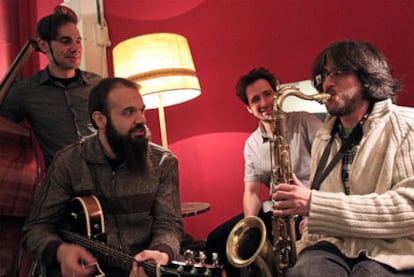The avant-garde rabble
The enigmatic sound of acclaimed indie band Dead Capo occupies a no man's land between rock and jazz - but don't ask them when their next album is out...
Music critic Chema García Martínez describes them as "modern in postmodern times - the biggest transgressors produced by this nation's jazz scene in years." Another music journalist, Jaime Gonzalo, wrote the following in the magazine Ruta 66: "This is probably the most articulate and creative instrumental band in the entire country."
The critics are unanimous: there are few acts in the capital quite so unclassifiable, so instrumentally talented and so much fun. What a paradox, then, that the band with the best instrumentalists in Madrid begins the conversation by talking about a children's ditty, La gallina turuleta. "It's amazing how much children love Hola, don Pepito and all those songs by Fofó and Miliki [two clowns who appeared on a popular children's show in the 1970s]. This afternoon I played them all," says Marcos Monge, who at 41 is the oldest of the four members of Dead Capo.
But here's an even greater paradox: the city's greatest virtuosos are forced to play at elementary school festivals in order to make ends meet. Or at least Monge is: the man who performed the classic melodies from Los payasos de la tele is the only band member who makes a living as a musician.
Marcos is blowing on a shiny sax. Before that, he rolled a cigarette. It's Friday at 8pm and Dead Capo's rehearsal studio must be the only place where it is possible to consume nicotine without getting slapped with a fine. This venue has a long history: it used to be an underground club called La Faena, which showcased rock and punk gigs.
After it was shut down, the cave-like space was converted into a rehearsal studio and a workshop for other activities. It is located in the area of Carabanchel, on a small street leading to Vía Carpetana. While Dead Capo rehearses, a girl sits in the upper part of the room crafting items for a stage set. It is a large space with two drum kits and enough room for the musicians to move around with ease. They pay around 600 euros a month for it, although they split the cost with another band.
Rehearsals begin with a song that faithfully reflects what Dead Capo stands for: it is a surf-style version of the sugary piece composed by Vangelis for the Blade Runner soundtrack. Besides Marcos, there are the three Javiers: Javier Díez, 36, whose thin, narrow sideburns seem to swing to the beat of his double bass; Javier Gallego, 36, who plays the drums with great elegance; and Javier Adán on guitar with his long beard à la latter-day-country-singer.
All four were anxious to add nuance to their widely accepted classification as jazz musicians: "Jazz is a genre that people might associate with serious music, and we are anything but. We have jazz influences, but we play with the intensity of a rock band, not with the finesse of jazz. We play jazz in a beastly way. That's why we call it jazz-punk."
They speak the truth. Dead Capo's specialty lies in combining styles in not-too-subtle ways, always through instrumental music. You could call it twisted jazz, or bastardized jazz. A song might start with a relaxed, sinuous blues melody only to be cut short by the sax player blowing into his instrument like his life depended on it. After that, the guitarist makes his presence known with the melody from the classic Spanish movie Atraco a las tres; finally, the double bassist bashes away at his instrument as though possessed by the spirit of Sid Vicious.
Such impetuousness is understandable in the context of the band's past: the four Dead Capo players used to play in rock gigs. They formed a band called Insecto in the 1990s, and played at Sala Maravillas, Madrid's epicenter of independent pop (which later became Nasti.) All four appreciate the musical voraciousness of John Zorn and soundtrack giants like John Barry."
"We've noticed a lot of girls in our audiences lately. People dance at our concerts, there is an incredible energy there. There is an important fun side to them, but there is also a cerebral side. A definition we like a lot is 'avant-garde rabble'," they say.
They have played at all of Madrid's venues and often cross into other regions to perform at jazz and rock festivals. But releasing albums is another story. In their 10-year career, they have only put out one CD, Díscolo, and more recently a single on vinyl. The scarcity of their output has become something of a joke.
"The other day I went to the police station at General Pardiñas to deal with some paperwork. The policeman asked me for my ID, stared at it and said, 'Are you the guy from Dead Capo?' 'Yes', I replied. And he asked, 'So, are you releasing a second album or what?'"

Tu suscripción se está usando en otro dispositivo
¿Quieres añadir otro usuario a tu suscripción?
Si continúas leyendo en este dispositivo, no se podrá leer en el otro.
FlechaTu suscripción se está usando en otro dispositivo y solo puedes acceder a EL PAÍS desde un dispositivo a la vez.
Si quieres compartir tu cuenta, cambia tu suscripción a la modalidad Premium, así podrás añadir otro usuario. Cada uno accederá con su propia cuenta de email, lo que os permitirá personalizar vuestra experiencia en EL PAÍS.
¿Tienes una suscripción de empresa? Accede aquí para contratar más cuentas.
En el caso de no saber quién está usando tu cuenta, te recomendamos cambiar tu contraseña aquí.
Si decides continuar compartiendo tu cuenta, este mensaje se mostrará en tu dispositivo y en el de la otra persona que está usando tu cuenta de forma indefinida, afectando a tu experiencia de lectura. Puedes consultar aquí los términos y condiciones de la suscripción digital.








































